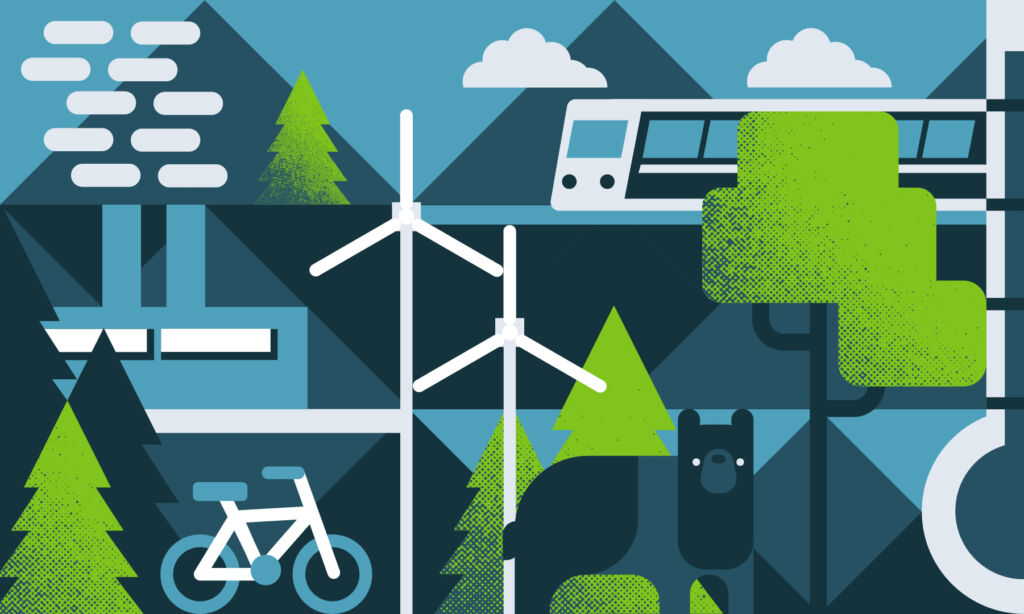The average Canadian household spends more than $2,400 per year on gas. For families with children, that figure is closer to $3,500 per year. With gas prices topping $2 per litre in some parts of the country, many households will be shelling out an extra $1,000 to $2,000 in transportation fuel costs this year.
Although transportation fuel only accounts for 2 to 3% of most households’ spending, the sticker shock is real. For some lower-income households and rural communities in particular, for whom energy spending makes up a bigger chunk of the monthly budget, rising prices put serious pressure on their ability to pay the bills.
In the long term, high oil prices may actually be a blessing for our efforts to transition to a zero-carbon economy (we’ll get to that in a bit). After all, a carbon price is supposed to do the same thing. But a well-designed carbon price rises gradually and predictably, which is not what’s happening here. Instead, prices are spiking in response to the volatile global oil market, which is creating equity problems at home.
Here’s what we should do to address high gas prices in the short, medium and long term.
Short term: redistribute oil industry profits
Not everyone is unhappy about high oil prices. The oil industry was making record profits even before the crisis in Ukraine sent prices—and profits—even higher. The industry is set to smash profit records again this year.
Canada should first introduce an excess profits tax to collect a portion of the tens of billions of extra dollars flowing into the oil industry. We’ve used taxes like that before to ensure corporate windfalls are actually serving the public good.
Next, Canada should redistribute as much of that revenue as is necessary to offset the price shock for vulnerable households. There are a few delivery options here, but the GST rebate is a perfect vehicle for getting money into the pockets of the people who need it most. Call it an “emergency short term inflation payment" if you like.
Medium term: accelerate consumer alternatives to fossil fuel-dependent personal vehicles
Telling cash-strapped Canadians to switch to electric cars isn’t a realistic option for most in 2022, but it could be by 2025. After cushioning the blow of high oil prices today, Canada should make every effort to accelerate the uptake of transportation options that aren’t dependent on fossil fuels.
Zero-emission vehicles (ZEVs) are an obvious priority here, and governments at all levels can do a better job of mandating their sale, incentivizing their purchase, and facilitating their use through better infrastructure. Governments should also be clamping down on internal combustion engines through stricter energy efficiency regulations and penalties for emissions.
But ZEVs aren’t the whole solution—or even most of the solution. Bottom line: we need to make it cheap and easy for people to walk, cycle or take transit to the places they need to go. And we need to do it quickly.
Fortunately, that’s possible if governments of all levels make it an immediate priority. Instead of building a new 400-series highway, for example, Ontario could be spending that money on new rail and bus links to formerly car-dependent residential communities. Active transportation infrastructure in particular can be brought online relatively quickly.
Long term: get fossil fuels out of the economy
The silver lining of high oil prices is that it provides a strong disincentive to buy or use oil, which is, ironically, exactly what a carbon price is supposed to do. Businesses and households should be asking themselves whether they can afford to keep using fossil fuels when cheaper lower-emission options are increasingly available. It’s the role of governments to make those greener choices even more obvious.
That doesn’t mean abandoning fossil fuels today. It means making decisions today that are consistent with a fossil fuel-free economy in the coming decades. For example, governments should ban new fossil fuel infrastructure, including in energy generation, home heating and personal transportation, so that households and businesses don’t lock into dead-end infrastructure.
Yet even if we were to fully decarbonize the Canadian domestic economy, Canada remains a major producer and exporter of fossil fuels. That means we’ll continue to be economically hitched to an industry that is fundamentally at odds with a climate-safe future.
The final piece of the puzzle is to establish a timeline for a managed transition out of the oil industry. Governments need to make clear that we are getting off the oil rollercoaster and genuinely committing to a net-zero world.
Ultimately, the best solution to high oil prices is to use less oil. It’s not, as the industry and its boosters suggest, to double down on oil production or to cancel the carbon price. The sooner we get started, the easier it will be.







